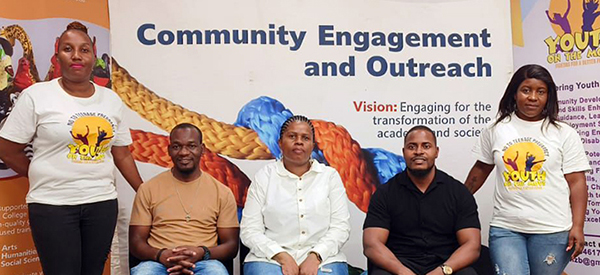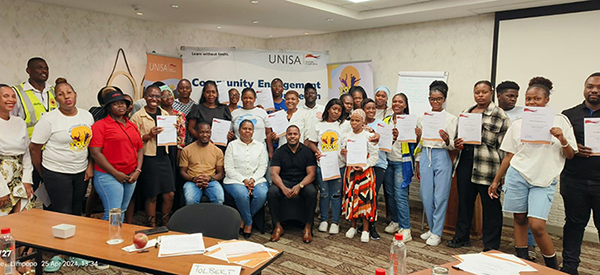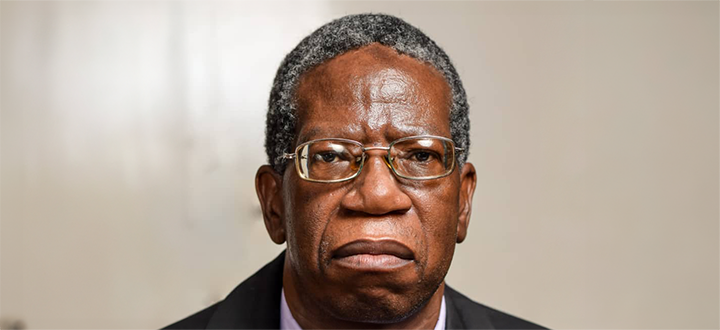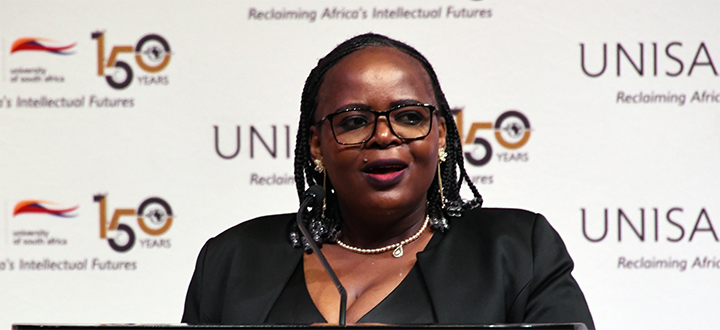College of Human Sciences
SHIP continues its quest to curb teenage pregnancy
On 23 April 2024, the School Health Integrated Programming (SHIP) team of the College of Human Sciences' Community Engagement Unit visited ME Makgatho High School in Seshego, Capricorn District. The team was accompanied by non-governmental organisations (NGOs) such as Youth on the Move, Mmane Joanah Humanity Foundation, Mane Shaena Home Schooling and Youth Alive.
SHIP was represented by Dr Rakgadi Grace Malapela, Dr Husani Matakanye of the Department of Health Studies, and Stanely Namakhota from the Office of the Vice-Principal: Teaching and Learning.

Stanley Namakhota, Dr Grace Malapela and Dr Hulisani Matakanye with members of Youth on the Move NGO
Malapela explained that the purpose of the visit was to raise awareness regarding teenage pregnancy in schools throughout Limpopo. Research and annual statistics show the rate of teenage pregnancy in Limpopo and KwaZulu-Natal to be worryingly high, with teenage pregnancy seriously curtailing the educational success of girls in rural areas. Malapela emphasised: "Education is important for teenage girls to break the cycle of poverty that traps most of them. Although they are allowed to return to school after becoming mothers, girls face many challenges in trying to balance motherhood and the demands of schooling." She further stressed the importance of educating girls about options that are available to them to prevent pregnancy.
The team also hosted a workshop on 24 and 25 April 2024 at Garden Court Polokwane, for 16 NGOs that focus on the youth, taking a holistic approach and covering their spiritual, social, physical, psychological and academic well-being. Open discussions were conducted with these NGOs, covering topics such as the definition of teenage pregnancy, the prevalence of teenage pregnancy in schools, the factors contributing to teenage pregnancy in schools, and the roles of institutions such as the community (including traditional, political, and community-based organisations, and NGOS), churches, families, schools, healthcare institutions and community health workers in preventing teenage pregnancy.
The discussions also explored the availability of programmes in communities intended to prevent or reduce teenage pregnancy, the influence of social media on teenage pregnancy, and strategies that can be employed to prevent teenage pregnancy.
Matakanye acknowledged that teenage pregnancy is a widespread issue affecting society and that achieving positive outcomes requires collaboration among multiple stakeholders.
Although social media must be acknowledged for its positive impact in teaching and information sharing, it nevertheless contributes to teenage pregnancy. Matakanye made the observation that social media has a significantly negative influence by providing teenagers with access to pornography, which may lead to curiosity and experimentation, ultimately resulting in teenage pregnancy.
Another concern raised was that many parents find it difficult to discuss sex with their children, and so young people lack proper guidance in this area. Additionally, poor role modelling can contribute to teenage pregnancy, as teenagers may receive misguided advice. It is crucial for NGOs to step in and address these issues by raising awareness about teenage pregnancy in both communities and schools. They should also encourage families to have open and honest conversations with their children, bridging the communication gap and providing the necessary guidance.

The School Health Integrated Programming team together with community health workers from various NGOs during a workshop in Limpopo
During the discussion, NGOs expressed their concerns regarding issues such as bullying, inadequate safety measures and inadequate health services within schools. In response to these concerns, the NGO Limpopo Chaplaincy Health and Community Care has taken proactive measures by organising workshops, campaigns and programmes offering counselling and covering topics such as gender-based violence and femicide, the school dropout rate, teenage pregnancy, substance abuse, HIV/AIDS, poverty alleviation and food security. These initiatives are conducted within schools and communities in collaboration with the South African Police Service. The efforts of this NGO are aligned with the National Strategic Plan on gender-based violence and femicide, specifically focusing on Prevention and Rebuilding Social Cohesion (Pillar 2), Response, Care, Support, and Healing (Pillar 4), and Economic Power (Pillar 5).
The NGOs discussed the importance of creating a forum to serve as a collaborative platform to effectively attend to the various needs of the youth. It was stressed that the participation of all NGOs and their collective efforts were crucial to achieving favourable outcomes.
* By Nnana Martina Jege, Communication and Marketing Specialist, College of Human Sciences
Publish date: 2024-05-14 00:00:00.0


 Mental health among men in the workplace needs more attention
Mental health among men in the workplace needs more attention
 "I owe everything to Unisa and my late supervisor's priceless mentoring"
"I owe everything to Unisa and my late supervisor's priceless mentoring"
 Majikijela - a queer scholar raising homosexuality awareness through his work
Majikijela - a queer scholar raising homosexuality awareness through his work
 Unisa and Inqaba Biotec unveil groundbreaking DNA research platform
Unisa and Inqaba Biotec unveil groundbreaking DNA research platform
 College of Law appoints esteemed scholar as executive dean
College of Law appoints esteemed scholar as executive dean